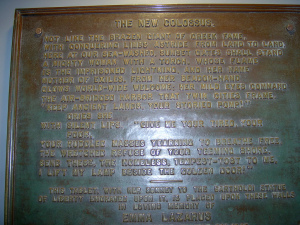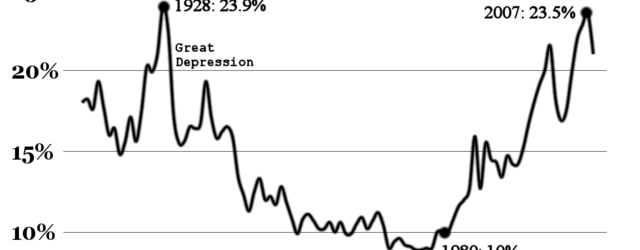The Occupy movement emphasizes the enormous gulf between owners – typified by the so-called 1% – and those who are struggling to make a living as wage-slaves or worse. The headline chart for this blog highlights that we’re approaching Great Depression levels of wealth inequality, in which 1% of Americans own 30% of its wealth. But an article published Tuesday states that globally things are much worse. 50% of the world’s wealth is owned by 1%, which got me thinking.
 US style capitalism is no villain. Principles of pragmatic egalitarianism are the foundation of this country, and its success is due to the fact that their implementation has led to shared success on a scale previously thought impossible. Emma Lazarus’ Sonnet The New Colossus, which graces the Statue of Liberty, sums this up nicely.
US style capitalism is no villain. Principles of pragmatic egalitarianism are the foundation of this country, and its success is due to the fact that their implementation has led to shared success on a scale previously thought impossible. Emma Lazarus’ Sonnet The New Colossus, which graces the Statue of Liberty, sums this up nicely.
The successful creation of a middle class of millions of people generally wealthier than many kings of old drives a sustained global prosperity the likes of which the world has never seen. This is but one reason I’ve resisted a basic premise of the Occupy Movement. To claim the right to share that which someone else owns is a recipe for unmitigated disaster. Human misery will spread like a virulent disease when such thinking takes hold. Nor is there, even with these horrible wealth distribution ratios, a need to radically implement policies based on such wrongheaded “humanitarianism”.
The path to prosperity will never come from trying to occupy that which you do not own. Rather it will come from taking ownership (in the full sense of that word) of that which we already possess. Given the democratic institutions which exist, and the tools that enable human ingenuity to work its magic, when people take ownership of their situation they can revitalize our nations, including this one. Ownership means tapping into the spirit which pioneered and grew new models of human activity, benefiting the masses in ways previously thought unthinkable.
 Earlier this year I was honored to present on the topic of The Human Heart of Business to a distinguished audience at a series of conferences in India. In those conferences I addressed what I believe to be both the problems and the solutions to the conundrum of wealth distribution. India is in many ways a pioneer in the idea of corporations taking full social responsibility. It was an inspiring 5 days, in a country that suffers under wealth inequality that is staggering to the Western mind. And yet the average Indian is hopeful and optimistic that things can be improved. And they are improving rapidly.
Earlier this year I was honored to present on the topic of The Human Heart of Business to a distinguished audience at a series of conferences in India. In those conferences I addressed what I believe to be both the problems and the solutions to the conundrum of wealth distribution. India is in many ways a pioneer in the idea of corporations taking full social responsibility. It was an inspiring 5 days, in a country that suffers under wealth inequality that is staggering to the Western mind. And yet the average Indian is hopeful and optimistic that things can be improved. And they are improving rapidly.
We can make a shift towards a more equitable distribution of wealth without jumping on a wealth re-distribution bandwagon. And yet I believe we must get very serious about this, very quickly. If we don’t begin to turn the ship on this and other major problems confronting mankind, we’ll be hitting a global iceberg soon – and we’ll experience the kind of global revolution that will make the French Revolution look like a cakewalk in comparison.
There are many models being put forward globally today in which corporations are extending the idea of who the stakeholders are, to which they owe responsibility to “maximize shareholder value”. There are many places where you can apply yourself to making a difference. One tiny example is this group I found on LinkedIn which has the audacious intent of Building Better Societies.
What examples have you found?




